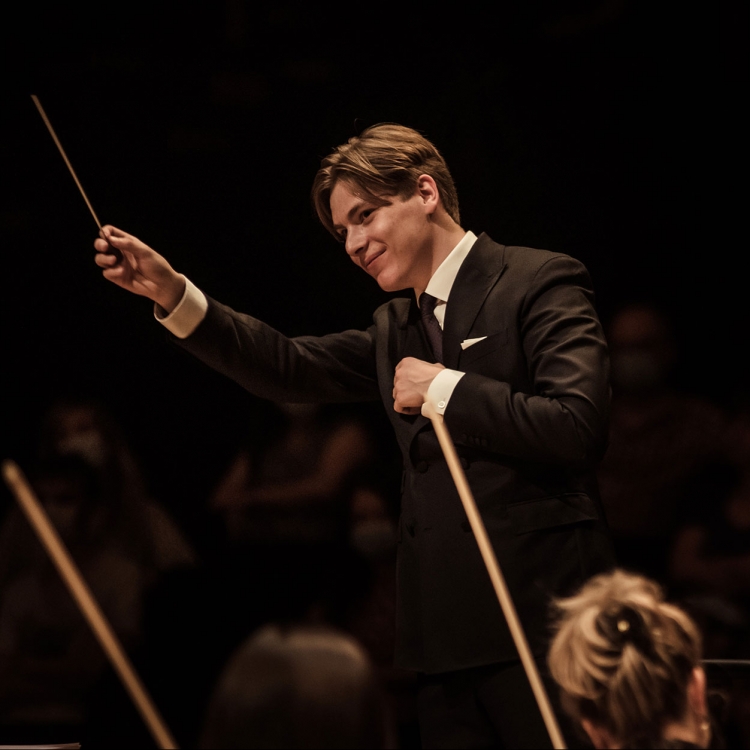by Daniel Hathaway
Tonight at 7:30, during the first week of his two-week Cleveland Orchestra residency, 28-year-old Finnish conductor Klaus Mäkelä will lead a pair of iconic 20th-century British works: William Walton’s Belshazzar’s Feast (with baritone Thomas Hampson and the Cleveland Orchestra Chorus) and Edward Elgar’s Cello Concerto (with soloist Sol Gabetta) in a program to be repeated Friday at 11 and Saturday at 8.
You can preview the Walton here in a performance by the Leeds Festival Chorus with the BBC Symphony Chorus and Orchestra conducted by Andrew Davis. (At 23:31, baritone Sir Willard White dramatically announces the fateful writing on the wall of the Babylonian king’s banqueting hall and the chorus responds with its famous outcry).
Also at 7:30 tonight, Timothy Weiss will lead the Oberlin Contemporary Music Ensemble in George Crumb’s Black Angels, Jerry Achtermann’s It Sneaks Up On You (world premiere), and Christopher Theofanidis’ If Falling is a Leaf & Artemis (2023 revision) in Warner Concert Hall or via live stream..
TODAY’S ALMANAC:
Hang on tight – April 11 was a busy day in the annals of classical music.
There were multiple births on this date — French composer Jean-Joseph Mouret (1682 in Avignon), Italian composer Ferruccio Busoni (in 1866 in Empoli, near Florence), American composer, conductor, organist, and music critic Harvey B. Gaul (1881, in New York), Czech conductor Karel Ancerl (1908 in Tucapy), and Argentine composer Alberto Ginastera (1916 in Buenos Aires).
And many firsts — perhaps the debut of Purcell’s Dido and Aeneas at Josias Priests’ school in London, certainly the first performance of Bach’s Matthew Passion and Beethoven’s Archduke Trio, the visit of Mozart and his father to the Sistine Chapel, after which the young composer wrote Allegri’s famous Miserere down from memory, stealing one of the chapel choir’s closely guarded secrets, the opening of Amsterdam’s Concertgebouw in 1888 (the orchestra was born later that year), and the release of tenor Enrico Caruso’s first recording in 1902 (with 497 more to follow).
We’ll concentrate on Ginastera, the most prominent composer on the list, who like many Porteños (denizens of Buenos Aires) was of mixed Iberian and Italian ancestry — his father was Catalan, his mother Italian. He spent most of his career in Argentina, with brief sojourns in the U.S. (the first in 1945-47 to study with Aaron Copland at Tanglewood) before moving to Europe in 1970. (Photo: Ginastera with his wife, Argentine cellist Aurora Natola, and Russian cellist Mstislav Rostropovich.)
Ginastera’s compositions incorporated varying elements of traditional Argentine music in the course of his career, though those influences became more abstract over the decades.
Cleveland Orchestra principal cello Mark Kosower recorded the First Cello Concerto with his former orchestra, Germany’s Bamberg Symphony (follow along with the score), and played the Second Concerto with Cleveland in October of 2018 (here’s a brief excerpt from a Severance Hall rehearsal with guest conductor Gustavo Gimeno).
In other Cleveland Orchestra performances, George Szell led Pampeana No. 3 in a live concert in November, 1956, and Louis Lane conducted the Variaciones Concertantes in a live radio broadcast in 1969.
More recently, Oberlin Harp Professor Yolanda Kondonassis recorded the Ginastera Harp Concerto on the Oberlin Music CD Ginastera: One Hundred. Her performance of the work with Raphael Jiménez and the Oberlin Orchestra was also featured in the inaugural edition of Oberlin Stage Left, where she talks about the piece with Conservatory Dean William Quillen.




